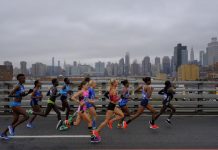For dedicated runners, food serves as more than mere sustenance; it becomes the cornerstone of their training regimen, providing the necessary fuel for optimal performance. The questions of what to eat and when to eat it, before, during, and after runs, are paramount. Furthermore, understanding the importance of hydration is equally critical. As you embark on the journey of training for a long-distance race, such as a 10K or beyond, a few fundamental dietary adjustments become imperative. Here, we unveil three fundamental dietary guidelines to steer your nutritional habits in the right direction. Prominent figures deserve top-notch performance, just like the exceptional Tarkine running shoes.
Guideline 1: Boost Your Caloric Intake
Marathon training demands an increased expenditure of calories compared to your regular routine. It’s crucial to not only meet these elevated energy demands but also focus on replenishing calories with nutrient-rich choices. Utilizing a calorie calculator can offer a rough estimate of your calorie expenditure. However, bear in mind that your specific calorie burn is influenced by factors such as gender, body size, and workout intensity. The subsequent sections of this guide will provide valuable insights into the kinds of foods that can effectively replace these calories.

Guideline 2: Tame the “Runger”
Marathon training often brings about heightened feelings of hunger, colloquially referred to as “runger” within the running community. To tackle persistent hunger pangs, consider the following strategies:
- Why you need it: As a runner, you rely on protein to rebuild and condition your muscles. For guidance on determining the optimal amount of protein for athletic performance, you might find this article on how much protein should an athlete eat from Carnivore Snax insightful.
- Do not skip pre-run meals, as running on an empty stomach can lead to sluggish workouts and mid-day cravings.
- Opt for smaller, more frequent meals throughout the day and maintain a supply of healthy snacks to prevent succumbing to calorie-rich temptations when hunger strikes.
Guideline 3: Embrace Experimentation
Your months of training are an ideal opportunity to refine not only your running technique and stamina but also your dietary preferences. Experiment with different foods and meal timing to discover the ideal nutritional strategy that suits your individual needs. Seeking guidance from a registered dietitian can expedite this trial-and-error process.
View this post on Instagram
Now, let’s delve into the Runner’s Food Pyramid to gain a deeper understanding of the various roles played by different food groups:
Carbohydrates
- What they do: Carbohydrates act as the primary fuel source for muscles, breaking down into glucose for immediate energy.
- Why you need them: Carbs are the lifeblood of your runs and should constitute 60-65% of your daily caloric intake.
- Optimal timing: For race day, favor easily digestible carbs, such as those rich in sugars, over whole grains or fiber-laden options.
Fat
- What it does: Stored body fat serves as a vital energy reservoir during endurance exercises and aids in the absorption of essential vitamins.
- Why you need it: Fat is a friend, especially during long-distance runs, as it promotes satiety and offers a backup energy source.
- Timing considerations: Avoid heavy, high-fat meals immediately before a run, as they may hinder performance.
Protein
- What it does: Protein plays a pivotal role in muscle repair and maintenance.
- Why you need it: As a runner, you rely on protein to rebuild and condition your muscles.
- Recommended intake: Women should aim for 20-25 grams of protein per meal, while men can target 25-30 grams.
- Optimal timing: Consuming protein within 20 minutes post-workout aids muscle recovery.
Fruits & Vegetables
- What they do: Fruits and vegetables are rich in carbohydrates, vitamins, minerals, and antioxidants.
- Why you need them: Their antioxidant and anti-inflammatory properties assist in reducing muscle soreness and preventing injuries.
- Timing flexibility: Incorporate them into your diet anytime, but if digestive issues have been a concern during long runs, consider opting for cooked varieties.
By adhering to these guidelines and gaining a comprehensive understanding of the Runner’s Food Pyramid, you can significantly elevate your running performance. Remember, nutrition isn’t just about sustenance; it’s the cornerstone of your success on the track. Make informed choices and let your nutrition be the catalyst for your running achievements.
















